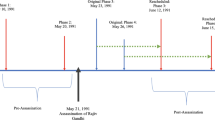Abstract
Nonrational factors affect the determination of policy. Points of vulnerability to the influence of nonrational factors are identified in the policy-forming process and in the policy-implementing process. The suggestion is made that a normative model for the policy-formation process must take account of the presence of nonrational influences so that they can be dealt with in a rational manner.
Similar content being viewed by others
References
Simon, Herbert, Administrative Behavior, p. xxiii. New York: Macmillan, 1959.
Vickers, Geoffrey, The Art of Judgement. New York: Basic Books, 1965.
Berle, Adolf A., Power, p. 62. New York: Harcourt, Brace and World, 1969.
Kennedy, Robert F., Thirteen Days, pp. 76–77. New York: Norton, 1969.
March, James G. and Simon, Herbert, Organizations, p. 84. New York: Wiley, 1959.
Dror, Yehezkel, Public Policymaking Re-examined. San Francisco: Chandler, 1968.
Author information
Authors and Affiliations
Rights and permissions
About this article
Cite this article
Costello, T.W. Psychological aspects: The soft side of policy formation. Policy Sci 1, 161–168 (1970). https://doi.org/10.1007/BF00145202
Issue Date:
DOI: https://doi.org/10.1007/BF00145202




